Tommy Cooper: Always Leave Them Laughing (35 page)
Read Tommy Cooper: Always Leave Them Laughing Online
Authors: John Fisher

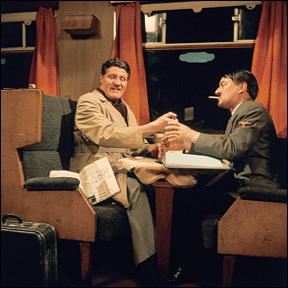
‘You’ve done some terrible, terrible things in your life!’: with Frank Thornton.
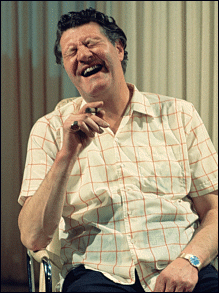
T. C. – Totally Convulsed.
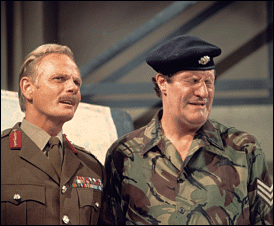
With staunch straight man, Allan Cuthbertson.
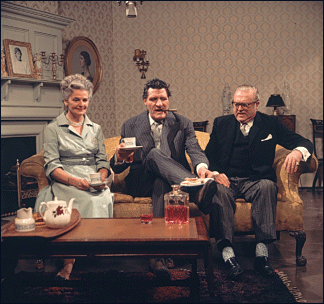
‘And do have a piece of my homemade cake’: with Betty Cooper and Robert Dorning.
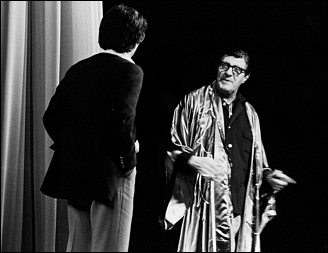
Tommy as the public seldom saw him: at rehearsals during the late Seventies.
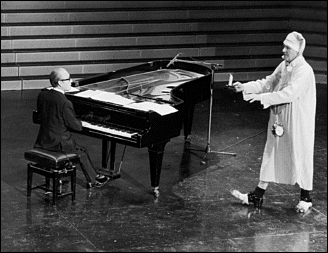
Our hero sleepwalks for his hero, Arthur Askey.
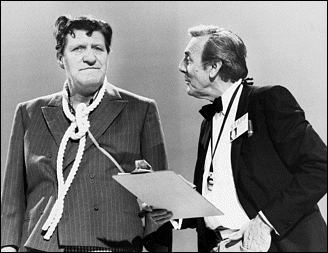
With Eric Sykes, special champion and dear friend.
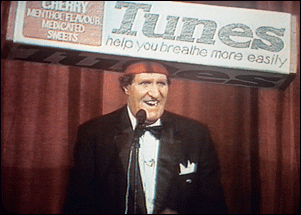
Image taken from the final television show, 15 April 1984.
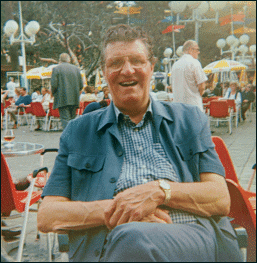
The last photograph, Las Palmas, 1984.
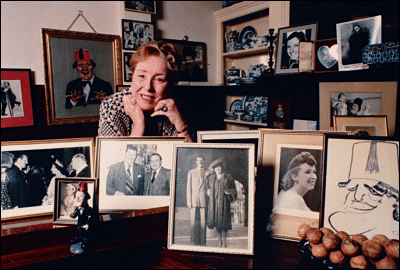
Tommy’s ‘Dove’ amongst her souvenirs.
Price
: You were supposed to wait for the count of three.
Cooper
: Well, one and two is three. (Price slinks to the ground)
Michael Bentine was featured in one episode, bringing with him some of his tried and tested material, which lost nothing in the translation to Cooper’s way of working. In one sketch he played a Soviet spy forced by officer Bentine to photograph indelibly in his memory the crucial information he must take into hostile territory and then to eat the source. Diary, plans, microfiche, even the model of a top secret rocket, all became Tommy’s diet in the line of duty. For most of the sequence, he remains silent, his expression veering tellingly between disgust, satiety and, courtesy of a salt cellar that happens to be in his pocket, relish as he is force-fed every unsavoury mouthful. Another sketch saw Michael in a favourite role as an obscure Middle Eastern sheikh subjecting Cooper’s plume-helmeted British emissary to a drinking ritual before negotiating an oil treaty. Tommy is forced to imbibe increasingly large measures of a lurid, steaming cocktail that was certainly not Orangina. Peter Reeves recalls that Tommy acted quite prudishly towards this item, although on this occasion Miff did not appear to demur, happy for his client to utter the payoff: ‘You must have an awful lot of camels!’
The least likely guest was the distinguished husky-voiced actress, Joan Greenwood. She commented afterwards that she found the experience ‘incredible, madly chaotic, and absolutely frightening’, adding that she ‘would not have missed it for anything’. The surprise of the television audience at seeing a smoking-jacketed Cooper joining forces with the svelte seductress in a Noël Coward pastiche was only matched by Tommy’s reaction when at the end of a spirited rendition of ‘Knees Up, Mother Brown’, the tag to the sketch, she launched
into a somersault and a full throated, ‘How’s your Father!’ According to Vosburgh, when in the spirit of fun she took it upon herself to stand on her head at rehearsals, Cooper – stereotyped in his attitude to the way women should behave – had trouble dealing with it. There were times, of course, when his own outré behaviour had a similar effect on others. Perhaps they were kindred spirits after all; Greenwood did list ‘circuses’ as her hobby in
Who’s Who in the Theatre
.
If anyone did manage to upstage him, Greenwood did, not that he had a problem with the situation. However, according to Vosburgh and fellow scriptwriter Garry Chambers, at another level Tommy always became self-conscious when working with women. Moreover, his persona made it impossible for him to achieve a sexual chemistry with any of his occasional leading ladies. Garry recalls how when Diana Dors appeared on the show in a daringly low-cut outfit, Cooper found it difficult to achieve a rapport with her at all. In Dick’s words, he was ‘frightened out of his skull’. A routine in which single-handedly he attempts to deputize for Diana’s disposed dancers and backing singers, gesticulating with a pink feather boa up, down and around as she sings her song, becomes a supreme display of comic embarrassment and the funnier because of it. Always, of course, there was the threat of Dove hovering in the background. With Thora Hird as a guest there was less of a problem.
In spite of the fun that often burst through the screen, it was not a happy series. Tommy became increasingly exasperated about finding enough material for his stand-up spots, while his growing health problems were beginning to make inroads on the smooth running of the schedule. When because of a combined lung and throat condition he had to miss a show – subsequently rescheduled – for the first time in twenty-one years, even the equable Brightwell had difficulty expending
sympathy: ‘He is of course his own worst enemy and I have no doubt that even during this period of enforced idleness, he will still be smoking his wretched cigars and talking when he should not be.’ In addition his legs were a constant cause of concern.
